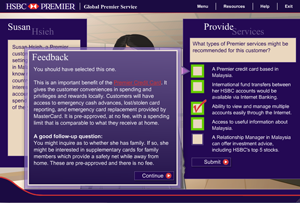Blog
e-Learning Fosters Efficient Mastery and Application
by Carla Torgerson, instructional strategist Often in eLearning, when learners answer a question, we tell them if they were right or wrong and give ...


The Power of Self-Assessment in Creating Interactive e-Learning
By Allen Interactions | October 02, 2009 | Custom Learning | 0 Comments
by Carla Torgerson, instructional strategist
Often in eLearning, when learners answer a question, we tell them if they were right or wrong and give feedback. This can be a useful way to teach, especially if the feedback provides guidance on why the learner is right or wrong and how they could do better next time.
However, I’m a fan of having the learner self-assess. Instead of telling the learner if he or she is right, can you give the criteria you would use and ask him/her to self-assess?

For example:
Expert approaches usually include 1, 2, and 3. With that in mind, how do you think you did?
You can even follow-up with choices to which you can give different feedback:
A) Great!
B) OK
C) Not so well
This is especially useful for longer text entry or more complex responses that would be difficult to program a computer to evaluate. (We can’t create artificial intelligence in our courses...)
This is useful from a practical perspective. But even more important to me is the educational advantages. When learners self-assess their performance, they are practicing the exact behavior we’d like them to be doing every day at work.
Training your learners to critically ask things like “Am I doing this right? If not, what should I change?” will help your learners perform optimally every day.
.png?width=135&height=135&name=ai-symbol-green%20(3).png)
About the Author: Allen Interactions
Comments
Would you like to leave a comment?
Related Blog Posts
By: Allen Interactions | Dec, 2009
Category: Custom Learning

Blog
The "Click Thru" Test: Mistakes in Corporate e-Learning
by Carla Torgerson, instructional strategist Often in eLearning, when learners answer a question, we tell them if they were right or wrong and give ...
By: Allen Interactions | Apr, 2009
Category: Custom Learning
.jpg?width=316&name=lee_steve_(2).jpg)
Blog
Templatized Learning Solutions
by Carla Torgerson, instructional strategist Often in eLearning, when learners answer a question, we tell them if they were right or wrong and give ...
By: Allen Interactions | Aug, 2009
Category: Custom Learning
